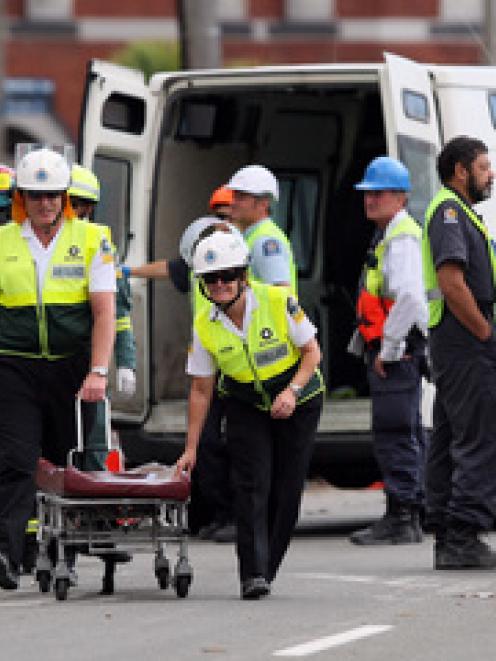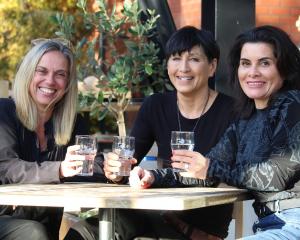
Nobody has been rescued alive from the buildings since Wednesday afternoon. Police insist they are still looking for survivors and not just recovering bodies.
However, as the weather deteriorates police are worried for the safety of the rescuers.
"[The] weather forecast...is for continual rain. What that means that some of the masonry that is unstable will become more unstable and that presents particular risk," Police Superintendent Dave Cliff told a media conference this morning.
"One of the staff operating on one of the sites was struck with a piece of masonry. Fortunately he had a helmet on and hasn't been seriously hurt, but it illustrates the risk.
Civil Defence director John Hamilton assured residents today that Christchurch would not run of food or petrol, with new fuel supplies arriving soon.
Earlier today police said they only recovered dead bodies overnight, but Superintendent Russell Gibson said this did not mean they would not find any more survivors.
"I spent quite some time...at the CTV building. The people there who are coordinating that -- from Australia and also Japanese -- all tell me that they have worked on buildings which look just like the CTV building and many days after the collapse they continue to pull people out."
Twelve streets in the coastal suburb of Redcliffs were evacuated around 10pm yesterday after a cliff was deemed to be unstable. Some residents had already left the area and last night's evacuees left willingly, police spokeswoman Sarah Kennett said.
Meanwhile, police started releasing names of victims yesterday, but warned it could be a long, protracted and painful process for families and loved ones.
"I'm not at this point able to identify by name any more of the deceased, but we will be working on that as quickly as I can," Mr Cliff said this morning.
The first four victims named by police are Joseph Tehau Pohio, 40, Jaime Robert McDowell Gilbert, 22, Jayden Harris, eight months, and Baxtor Gowland, five months, were named yesterday. All were from Christchurch.
Police appealed for understanding from families as they work to identify the bodies of victims.
"We know it's an agonising wait for families desperate to find out about their loved-ones, but there is a legal requirement for this work to be completed to standards set by the Coroner," police disaster victim identification commander Mike Wright said.
Police were required to follow the international process of disaster victim identification, which did not rely solely on visual identification as in stressful conditions distraught relatives could often mistakenly identify loved ones.
At least 106 staff were working quickly but methodically on identification which included using fingerprints, DNA, dental records and personal information, he said.
Police today said no survivors or bodies had been pulled from the rubble overnight. About 600 search and rescue staff have been working in shifts searching the central city rubble.
The teetering Hotel Grand Chancellor remained standing overnight, despite sizeable aftershocks continuing to rattle the city.
Up to 122 people are unaccounted for in the Canterbury TV building, including 90 international students and staff from private training school King's Education.
Hope has faded for survivors at the flattened Pyne Gould Corp building, and police estimate between 16 and 22 people were killed by falling masonry at the ChristChurch Cathedral buildings.
Rescue workers were using a "process involving sniffer dogs, acoustic testing -- looking for any sound -- along with cameras which are used to place within the rubble itself to look for any sign of life", Mr Cliff said.
"If we find a body but we can't recover it quickly, we will carry on. This is very much an operation around rescue, it's looking for the living," he said.
International help has been reaching Christchurch, with rescue teams coming from Australia, Britain, Japan, Singapore, China, Taiwan and the United States.
Much of Christchurch's infrastructure is damaged, although the port and Lyttelton tunnel are due to open on Saturday.
Welfare centres were busy today, but reported coping with demand despite the lack of water, sewerage and power facilities.






